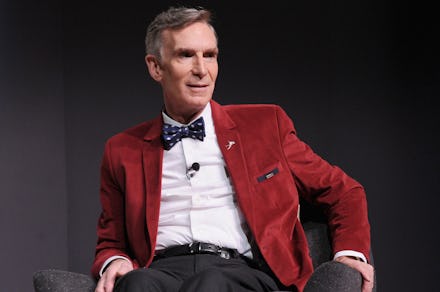Bill Nye Just Nailed Why We're So Fascinated by Artificial Intelligence

New York — Bill Nye may concern himself with the nuts and bolts of scientific phenomena, but sometimes he likes to get existential.
During a discussion on Tuesday afternoon with musician and DJ Steve Aoki, the Science Guy tackled life's biggest questions: Where did we all come from? How did we get here? Are we really alone in the universe?
As open-ended as these inquiries may be, Nye explained, we're always attempting to answer them — and our quest to develop sophisticated forms of artificial intelligence is a perfect example.
"Why would you want to create a computer that's as smart as a human, or acts like a human?" Nye asked the packed audience, who had gathered to hear him and Aoki speak as part of Fast Company's Innovation Festival.
"I think the answer is, you're trying to figure out how it works. How did we get here? How do our brains work? How do I know that I know anything? How am I conscious that I'm conscious? These are difficult-to-answer questions ... [and] we're fascinated with it."
In Nye's view, our endless fascination with creating robots as intelligent as humans are stems from our constant — and, let's face it, terrifying — ignorance of our true origins. If we can build a robot from scratch that matches us in intelligence and capability, we're one step closer to understand how we came to be.
Nye also touched upon our artistic connections to these concepts — the conversation centered around the relationship between science and creativity — discussing movies like Ex Machina and Her. He's a big fan of the latter film, as it sees artificial intelligence in a relatively positive light.
He's not the only one who has grappled with this fascination. In fact, Ex Machina's writer and director, Alex Garland, touched on this very topic in an interview with the Washington Post.
"It certainly looks like there's something in the zeitgeist about it," Garland said. "I personally look at the fact that there are these enormous tech companies that have power that seems to grow exponentially ... It's actually the tech company, but it can seem to be the machine, because it will anticipate the thing that we're trying to type into the search engine. It understands something about our shopping habits and things that make us feel slightly uneasy."
Likewise, Stephen Hawking is uneasy about the rise of the machine. "The development of full artificial intelligence could spell the end of the human race," he told the BBC last December. "It would take off on its own, and re-design itself at an ever increasing rate ... Humans, who are limited by slow biological evolution, couldn't compete, and would be superseded."
Luckily for Hawking, according to Garland, our robot overlords aren't going to take over for a while.
"I got to meet a variety of people who are at the absolute cutting edge of these areas, either in understanding the mechanics of human consciousness or strong AI, and I got the same message from all of them," he told the Washington Post. "Which is that it's pretty hard, and it's not around the corner. We're asking big questions, but there's so much left to learn."